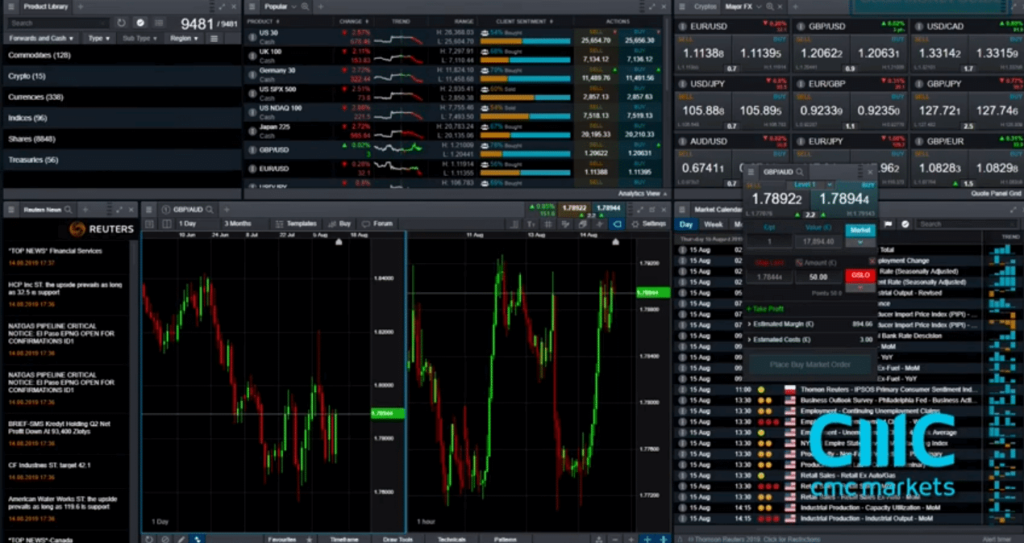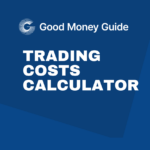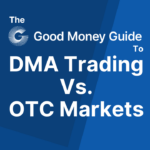CFD trading platforms make money in two principal ways firstly if they act as agents they earn a commission on each trade their clients make and an income from the overnight funding charges they levy.
However they may also act as principal in which case they make prices to their clients and capture the spread between those prices, they oppose their clients trading taking an equal and opposite position. Under this model the firm will profit if the client loses and lose will if the clients profit.
In an age of computerised trading firms often operate a hybrid model under which certain trades and clients receive an agency execution service, whilst others are “B”- booked i.e. the firm takes on the clients trade on its B or principal book. Those B book positions may be hedged from time to time based on internal market exposure rules.
Note though that in CFD trading whether your trade execution is under agency or B-book arrangement your trade counterparty is always your CFD trading platform or provider.
If you are trading CFDs or spread betting on stocks here are six hidden costs and dangers that you probably haven’t though about.
Trading OTC or over the counter’ products such as CFDs & spread betting will always be dangerous and especially risky if you are dealing on margin, where you can lose more than your initial deposit.
You should be aware of that fact as pretty much every financial promotion, website, account form and contract note will have a risk warning on it somewhere.
Although according to the FCA’s insight website we may all be suffering risk warning fatigue.
So, other than making or losing huge sums (relative to your initial margin) what other dangers lurk in the shark “invested” waters of ultra high-risk CFD trading?
Here’s a list of things to watch out for when trading CFDs:
CFD trading commission or spread widening
There are generally two types of execution charges for trading CFDs. Either commission with clean prices, or no commission with a widened spread.
If you get charged commission it means you buy or sell at the actual bid/offer or inside if you are using a DMA (Direct Market Access) broker.
If you are being charged a spread then you won’t get charged a commission, but you will be buying or selling at a price slightly wider than the bid/offer. So for example, if a stock is trading 101/102 your price maybe 100.9/102.1.
The spread is usually widened inline with what the commission would be. In this case 10 basis points or 0.1%You will agree to a commission rate when you open an account phrased either as “basis points” or as a percentage.
If you are spread betting you may find a broker who can offer you DMA on some smaller stocks by getting them to work an offer in the underlying market. But generally, you will be charged a widened spread.
If you are charged 0.1% commission that’s £100 on a £100,000 trade or 10 basis points. They are the same, just different terminology.
Normally, most brokers are quite clear about this, but it is worth checking you are not being charged double. If you have a high commission and don’t get market prices, it may be time to change your broker.
For larger traders paying commission and trading, DMA means you can trade inside the best bid/offer. The ability to get within the spread can often compensation for paying commission on wider prices.
CFD interest on overnight positions.
Just like when you borrow money from the bank, when you are trading a CFD you are borrowing to do so, and there is an interest rate attached.
A long time ago, when I opened my first CFD account I vividly remember the salesman saying, “well, you get charged around 2.5% over/under base, but you shouldn’t really factor that into your trading”.
Hmmm, not LIBOR base, the firm’s base, which depending on the currency can currently be above 3%.
So that’s 3%+2.5% or 5.5% on your positions size (depending on the first it will either be the initial position size of the daily, you need to check).
So if you buy £100k of stock and hold it for a year that’s £5,500 in interest charges.
As with everything else in trading these rates are negotiable if your account is large enough.
You can read more on overnight financing charges here.
FX currency deficits on CFD trading P&L
Most CFD trading platforms will have your account in one currency and do automatic currency conversions into that currency when you have a different currency P&L.
But your broker may have a treasury cost to running a book in multiple currencies and will charge accordingly.
So, if you put £100k on your account and trade GBP stocks, but then buy $100k of US stock on 10% margin. You have a GBP but no USD. So you are essentially running a USD overdraft to fund the USD position. You may not have a margin call, because your GBP nets off the USD.
But as your broker has bought the USD stock to write a CFD around, they have still had to lodge USD with the exchange for the purchase, and will, therefore, pass the costs of this on to you.
Some institutional or professional brokers are reluctant to do automatic FX conversions for clients trading in different currencies, as some like the currency exposure.
Plus a currency can move 10%, so your broker would be susceptible to client complaints if the 10% move was in their favour.
If you are trading on markets around the world, make sure that you regularly check your currency exposure and instigate conversions where necessary.

Richard is the founder of the Good Money Guide (formerly Good Broker Guide), one of the original investment comparison sites established in 2015. With a career spanning two decades as a broker, he brings extensive expertise and knowledge to the financial landscape.
Having worked as a broker at Investors Intelligence and a multi-asset derivatives broker at MF Global (Man Financial), Richard has acquired substantial experience in the industry. His career began as a private client stockbroker at Walker Crips and Phillip Securities (now King and Shaxson), following internships on the NYMEX oil trading floor in New York and London IPE in 2001 and 2000.
Richard’s contributions and expertise have been recognized by respected publications such as The Sunday Times, BusinessInsider, Yahoo Finance, BusinessNews.org.uk, Master Investor, Wealth Briefing, iNews, and The FT, among many others.
Under Richard’s leadership, the Good Money Guide has evolved into a valuable destination for comprehensive information and expert guidance, specialising in trading, investment, and currency exchange. His commitment to delivering high-quality insights has solidified the Good Money Guide’s standing as a well-respected resource for both customers and industry colleagues.
You can contact Richard at richard@goodmoneyguide.com




